 21 citations,
January 2005 in “Pediatric Dermatology”
21 citations,
January 2005 in “Pediatric Dermatology” An 8-year-old girl with vitiligo developed extra hair growth on her knee after using tacrolimus ointment.
14 citations,
June 2011 in “Australasian Journal of Dermatology” An 8-year-old boy had both alopecia areata and vitiligo on the same spot on his scalp, which is very rare.
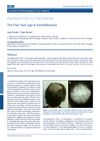 13 citations,
June 2012 in “Journal of Dermatological Case Reports”
13 citations,
June 2012 in “Journal of Dermatological Case Reports” An 8-year-old boy with hair-pulling disorder had a bald patch that was confirmed not to be a fungal infection and was treated with therapy.
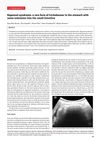 6 citations,
January 2018 in “Acta dermatovenerologica Alpina, Pannonica et Adriatica (Tiskana izd.)”
6 citations,
January 2018 in “Acta dermatovenerologica Alpina, Pannonica et Adriatica (Tiskana izd.)” An 8-year-old girl with Rapunzel syndrome had a hairball removed from her stomach and intestines and recovered well after surgery.
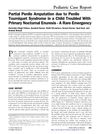 6 citations,
January 2013 in “Urology”
6 citations,
January 2013 in “Urology” An 8-year-old boy with bed-wetting issues suffered a severe penile injury from tying a thread around his penis, requiring urgent medical treatment to avoid worse outcomes.
 5 citations,
August 2018 in “PubMed”
5 citations,
August 2018 in “PubMed” An 8-year-old with severe hair loss regrew all hair after six months of tofacitinib treatment.
5 citations,
August 1925 in “Archives of dermatology” An 8-year-old boy with Recklinghausen's Disease shows various symptoms and is from a family with close genetic ties.
 4 citations,
August 2017 in “Journal of cutaneous pathology”
4 citations,
August 2017 in “Journal of cutaneous pathology” An 8-year-old girl had a rare, benign skin tumor on her forehead.
 4 citations,
January 2015 in “Case reports in urology”
4 citations,
January 2015 in “Case reports in urology” An 8-year-old boy recovered from a rare case of penile tourniquet syndrome after hair removal surgery.
3 citations,
January 2021 in “International journal of general medicine” An 8-year-old boy with a scabies infection was successfully treated with permethrin, antihistamines, and antibiotics.
 2 citations,
August 2021 in “Journal of Clinical Psychopharmacology”
2 citations,
August 2021 in “Journal of Clinical Psychopharmacology” An 8-year-old girl's eyebrow hair loss was linked to atomoxetine for ADHD but grew back after stopping the medication.
 1 citations,
January 2021 in “Arthritis Research & Therapy”
1 citations,
January 2021 in “Arthritis Research & Therapy” About 8% of people with systemic lupus erythematosus have chronic scarring alopecia, with certain symptoms and positive antibodies increasing the risk, while immunosuppressants may lower it.
1 citations,
February 2020 in “Journal of the Canadian Association of Gastroenterology” An 8-year-old boy developed a rare condition after a liver transplant, which improved after changing his medication.
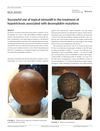 1 citations,
August 2019 in “Pediatric dermatology”
1 citations,
August 2019 in “Pediatric dermatology” Topical minoxidil helped an 8-year-old boy with a genetic hair disorder grow hair.
 1 citations,
September 2013 in “The Journal of Dermatology”
1 citations,
September 2013 in “The Journal of Dermatology” An 8-year-old girl developed a rare skin condition in a linear pattern on one side of her body after a lung infection, which improved with treatment.
 December 2023 in “Clinical Cosmetic and Investigational Dermatology”
December 2023 in “Clinical Cosmetic and Investigational Dermatology” An 8-year-old Saudi boy was diagnosed with a rare genetic disorder causing hair loss, skin issues, and light sensitivity.
 November 2022 in “Journal of the Endocrine Society”
November 2022 in “Journal of the Endocrine Society” An 8-year-old boy's early puberty was caused by a rare hormone-secreting brain tumor, which was successfully treated with surgery.
 September 2022 in “IP Indian journal of clinical and experimental dermatology”
September 2022 in “IP Indian journal of clinical and experimental dermatology” An 8-year-old girl has a rare genetic disorder causing complete, irreversible hair loss and skin bumps.
 January 2021 in “Journal of the European Academy of Dermatology and Venereology”
January 2021 in “Journal of the European Academy of Dermatology and Venereology” PrEP doesn't increase STI risk in high-risk men, anti-androgen drugs may lower ICU admission for male COVID-19 patients, a 3-point injection is better for crow's feet, and the 'Geriatric-8' tool could help assess frailty in older skin cancer patients.
 April 2020 in “International journal of research in dermatology”
April 2020 in “International journal of research in dermatology” An 8-year-old girl has a rare, irreversible hair loss condition caused by a genetic mutation.
 February 2017 in “Medicina cutánea ibero-latino-americana”
February 2017 in “Medicina cutánea ibero-latino-americana” An 8-year-old boy with hair loss had hair regrowth and responded well to clobetasol propionate treatment.
 April 2014 in “Jurnal Biomedik : JBM”
April 2014 in “Jurnal Biomedik : JBM” An 8-year-old girl had nail and hair issues that improved without specific treatment, but fungal nail infection was hard to cure.
4 citations,
July 1987 in “Laboratory Animals” Female rats aged 8 weeks are best for this model.
 1 citations,
July 2023 in “Journal of Biophotonics”
1 citations,
July 2023 in “Journal of Biophotonics” Red light at 8 mW/cm2 most effectively promotes hair cell growth and affects key growth pathways, especially in cells treated with a hair loss-related hormone.
 142 citations,
September 2020 in “Journal of neurophysiology”
142 citations,
September 2020 in “Journal of neurophysiology” Young adults have about 230,000 tactile nerve fibers, decreasing 5-8% per decade with age.
11 citations,
October 1997 in “British Journal of Dermatology” Wool follicles grew fibres for 8-10 days in a serum-free culture, influenced by calcium, glucose, amino acids, and insulin.
 51 citations,
November 2011 in “Reproductive Biology and Endocrinology”
51 citations,
November 2011 in “Reproductive Biology and Endocrinology” About 13% of women had idiopathic hirsutism and 8.5% had polycystic ovary syndrome in a group of Iranian women.
 40 citations,
February 2002 in “International Journal of Dermatology”
40 citations,
February 2002 in “International Journal of Dermatology” Permanent hair dye damages hair but it mostly recovers after 8 weeks; using certain hair care products can help repair it.
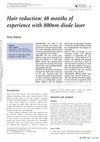 20 citations,
December 2003 in “Journal of Cosmetic and Laser Therapy”
20 citations,
December 2003 in “Journal of Cosmetic and Laser Therapy” An 800nm diode laser safely and effectively reduces hair for about 8 months, with most patients satisfied and few side effects.
 14 citations,
May 2013 in “Emerging infectious diseases”
14 citations,
May 2013 in “Emerging infectious diseases” Cryptococcus gattii can remain dormant in animals for over 8 years.
























